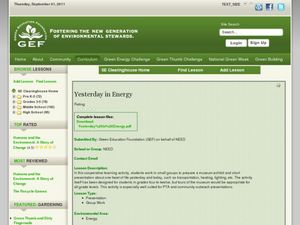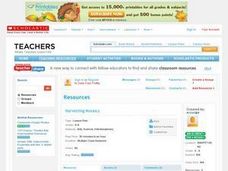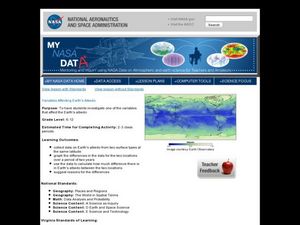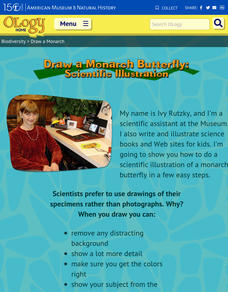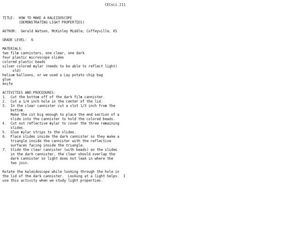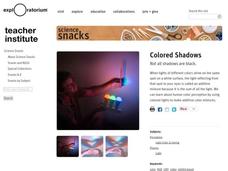Curated OER
Changing Sounds
Students identify how the pitch and the loudness of an instrument can be altered. In this online science of sound lesson, students employ the use of an interactive whiteboard to examine the loudness and pitch of a guitar, drum, and...
Curated OER
Changing State
Learners investigate the cooling and heating of water. In this online science experiment lesson, students work in groups to make predictions regarding freezing and boiling points and then test those predictions as they complete the...
Curated OER
Characteristics of Materials
Young scholars describe and compare common properties of various classroom materials. In this science/matter lesson, students observe common classroom items and the materials they are made of to complete a list of common properties.
Curated OER
Sandwich Stratigraphy
Two activities are included in this resource. In the first, junior geologists model sedimentary rock layers, apply the Law of Superposition, and demonstrate folding and faulting of the Earth's crust. The model is technically a sandwich....
Curated OER
Specialized for the Sea
Students use pictures and make a mural to investigate how ocean animals are adapted to certain parts of their environment.
Curated OER
Yesterday in Energy
Clever! Collaborative groups of environmental scientists create a museum exhibit and presentation for an energy-using activity such as heating a home or transportation. They must compare past to present use of energy for that particular...
Curated OER
Harvesting Mosaics
Students use pieces of farm pictures to investigate the elements of art. For this farm art lesson, students use pieces of pictures to create an original artwork. Students use the Internet to find images. Students create a...
Curated OER
Variables Affecting Earth's Albedo
Students study the variables that affect the Earth's albedo. In this environmental data analysis activity students interpret and graph information and calculate changes.
Mr. E. Science
Volcanoes
What is the difference between a shield volcano and a cinder cone volcano? How does the flow of lava influence the type of rock that's formed? A presentation on different aspects of volcanoes answers these questions for middle...
American Museum of Natural History
Draw a Monarch Butterfly: Scientific Illustrations
One doesn't have to be an artist to appreciate nature. A thorough resource shows pupils how to create detailed illustrations of a monarch butterfly. The lesson highlights the benefits of creating scientific drawings as opposed to simply...
BBC
Ourselves
Young biologists identify parts of the body, sort humans from other animals, and list the difference they see. Learners are split up into groups of three, and each group must find pictures in magazines of humans and other animals. They...
Serendip
Photosynthesis and Cellular Respiration
How does energy from the sun make plants grow? Scholars move step by step through the processes that promote plant propagation during a detailed lesson. The resource illustrates ADP production and hydrolysis, then allows learners to...
BBC
Sound and Hearing
First and second graders recognize that sound is generated in a variety of ways, and that it comes from many different sources. They explore tone and volume, realizing that there are different ways to describe sound. Some musical...
It's About Time
Volcanic History of Your Community
Did you know there are 20 volcanoes erupting at any given time? Pupils look at various igneous rocks, read local geologic maps, and determine if their area has a history of volcanic activity. A reading passage and analysis questions...
Curated OER
How to Make a Kaleidoscope
Sixth graders create a kaleidoscope. In this light refraction lesson, 6th graders create a kaleidoscope to investigate the properties of light.
Curated OER
Heat Currents
Students using a slide made out of aluminum foil and pin holes observe visible light.
Curated OER
Sun Smarts
Students discuss the harmful effects of UV radiation. In this health science instructional activity, students examine the . They suggest ways to protect themselves against UV.
Curated OER
Exploring Solar Beads
Young scholars discover solar energy beads and learn about ultraviolet light. In this solar energy instructional activity, students learn about solar energy beads, ultraviolet light, and UV radiation dangers. Young scholars experiment...
Curated OER
Solar S'Mores
Pupils see that solar energy is the energy given off by the sun. They explain that when light energy is absorbed by objects it is changed to heat energy and that dark-colored objects absorb more light and store more heat from sunlight.
Curated OER
Solar S'Mores
Students investigate solar energy. In this solar energy lesson, students compare how heat is absorbed in light-colored objects and dark-colored objects by making S'mores.
Curated OER
A Bioluminescent Gallery
Students examine the different types of luminescence in deep sea organisms. In this bioluminescence lesson, students investigate how color and light aide deep ocean organisms by describing the characteristics of the habitat and...
Curated OER
Simulation of Irradiation
In this irradiation worksheet, students simulate the effects of irradiation on bacteria growth by using UV light. Then students complete 6 short answer questions.
Curated OER
Experiment: Rainbow Shadows
In this science experiment with light activity, students explore what shadows can be created with the use of different colored bulbs and flashlights.
Curated OER
Colored Shadows
Students examine how humans perceive color. In this refracted light lesson, students explore the different ways color is seen by the human eye. Students will use colored lights and colored paper and solid objects to make additive color...





